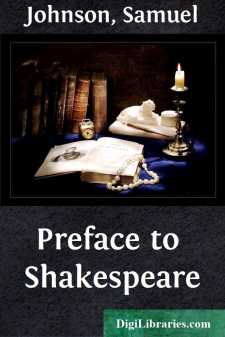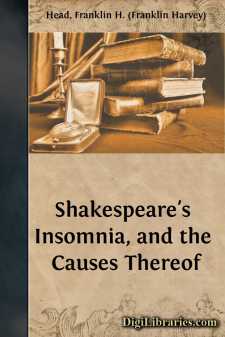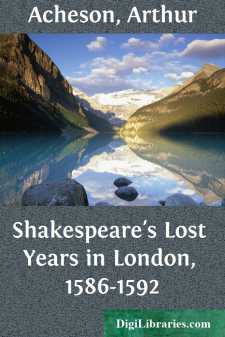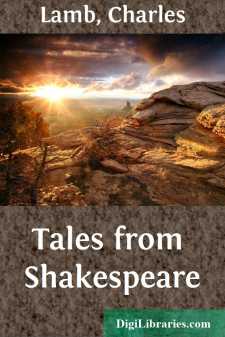Literary Criticism
- American 18
- Ancient and Classical 3
- Asian 1
- Australian & Oceanian 1
- Books & Reading 8
- Caribbean & Latin American 2
- Drama 2
- English, Irish, Scottish, Welsh 49
- European 7
- General 37
- Horror 1
- Humor 2
- Jewish 2
- Medieval 2
- Middle Eastern 3
- Poetry 7
- Renaissance 6
- Russian & Former Soviet Union 1
- Shakespeare
Shakespeare Books
Sort by:
by:
Samuel Johnson
TRAGEDIES Vol. IV (392) Most of the notes which the present editor has subjoined to this play were published by him in a small pamphlet in 1745. I.i (393,*) Enter three Witches] In order to make a true estimate of the abilities and merit of a writer, it it always necessary to examine the genius of his age, and the opinions of his contemporaries. A poet who should now make the whole action of his...
more...
by:
Samuel Johnson
PREFACE TO SHAKESPEARE That praises are without reason lavished on the dead, and that the honours due only to excellence are paid to antiquity, is a complaint likely to be always continued by those, who, being able to add nothing to truth, hope for eminence from the heresies of paradox; or those, who, being forced by disappointment upon consolatory expedients, are willing to hope from posterity what...
more...
SHAKESPEARE AND PRECIOUS STONES So wide is the range of the immortal verse of Shakespeare, and so many and various are the subjects he touched upon and adorned with the magic beauty of his poetic imagery, that it will be of great interest to refer to the allusions to gems and precious stones in his plays and poems. These allusions are all given in the latter part of this volume. What can we learn from...
more...
INTRODUCTION. When a small impression of these quaint old books issued from the Chiswick Press, many years ago, under the auspices of the late Mr. S. W. Singer, that gentleman merely designed the copies struck off for presentation to a select circle of literary friends who, like himself, felt a warm interest in every relic of the past which helped to illustrate Shakespeare and ancient English manners....
more...
PREFACE When I was invited to reprint in book-form the articles which had appeared in the Genealogical Magazine under the titles of "Shakespeare's Family" and the "Warwickshire Ardens," I carefully corrected them, and expanded them where expansion could be made interesting. Thus to the bald entries of Shakespeare's birth and burial I added a short life. Perhaps never before...
more...
I. Insomnia, the lack of "tired Nature's sweet restorer," is rapidly becoming the chronic terror of all men of active life who have passed the age of thirty-five or forty years. In early life, while yet he "wears the rose of youth upon him," man rarely, except in sickness, knows the want of sound, undreaming sleep. But as early manhood is left behind and the cares and perplexities...
more...
by:
Arthur Acheson
CHAPTER I INTRODUCTORY The most interesting and important fifteen years in the records of English dramatic literature are undoubtedly those between 1588 and 1603, within which limit all of Shakespeare's poems and the majority of his plays were written; yet no exhaustive English history, intelligently co-ordinating the social, literary, and political life of this period, has ever been written....
more...
by:
Anonymous
INTRODUCTION The identity of the "Anonymous" of Some Remarks on Hamlet Prince of Denmark has never been established. The tradition that Hanmer wrote the essay had its highly dubious origin in a single unsupported statement by Sir Henry Bunbury, made over one hundred years after the work was written, in his Correspondence of Sir Thomas Hanmer, with a Memoir of His Life (London, 1838), to the...
more...
by:
Charles Lamb
There was a certain island in the sea, the only inhabitants of which were an old man, whose name was Prospero, and his daughter Miranda, a very beautiful young lady. She came to this island so young, that she had no memory of having seen any other human face than her father's. They lived in a cave or cell, made out of a rock; it was divided into several apartments, one of which Prospero called his...
more...
by:
Jesse Johnson
INTRODUCTORY The Shakespearean Sonnets are not a single or connected work like an ordinary play or poem. Their composition apparently extended over a considerable time, which may be fairly estimated as not less than four years. Read literally they seem to portray thoughts, modes or experiences fairly assignable to such a period. Though variable and sometimes light and airy in their movement, the...
more...











